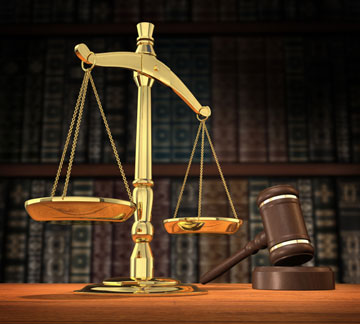Law and Society Directory
Regional Directory > Law
Lawyers practice in many diverse and specialized areas of law including business, criminal, environmental, family, international, labor, property, taxation, and tort. They often play diverse roles, acting as advisors, mediators, evaluators, negotiators, advocates, agents, or fiduciaries for corporations, governments, not-for-profits, and individuals. Lawyers typically have four years of undergraduate study followed by three years of law school. Undergraduates must pass the LSAT (Law School Admission Test) before gaining admission into law school. Upon graduation, candidates receive a Juris Doctor (J.D.) degree, and must pass the state Bar association exams before beginning practice in their specialized area.
 Other professionals working in the legal realm include paralegals, legal
secretaries, and e-discovery professionals. Paralegals help lawyers
prepare for closings, hearings, trials, and meetings by investigating
facts and identifying appropriate laws, judicial decisions, and other
materials that are relevant to a case. They prepare written
reports, organize and track files, draft contracts, and maintain
financial office records. Many paralegals complete a paralegal
program through a community college, but others earn a certificate in
paralegal studies, and some are trained on the job. A few schools
offer bachelor's and master's degrees in paralegal studies. Legal
secretaries prepare correspondence and legal papers for an attorney or
paralegal, and assist with legal research. Often, legal secretaries
have some form of on-the-job training combined with courses from a
technical school or community college. E-discovery professionals
help locate, gather, and manage electronic data for litigation. They
often have a background in information technology or law.
Other professionals working in the legal realm include paralegals, legal
secretaries, and e-discovery professionals. Paralegals help lawyers
prepare for closings, hearings, trials, and meetings by investigating
facts and identifying appropriate laws, judicial decisions, and other
materials that are relevant to a case. They prepare written
reports, organize and track files, draft contracts, and maintain
financial office records. Many paralegals complete a paralegal
program through a community college, but others earn a certificate in
paralegal studies, and some are trained on the job. A few schools
offer bachelor's and master's degrees in paralegal studies. Legal
secretaries prepare correspondence and legal papers for an attorney or
paralegal, and assist with legal research. Often, legal secretaries
have some form of on-the-job training combined with courses from a
technical school or community college. E-discovery professionals
help locate, gather, and manage electronic data for litigation. They
often have a background in information technology or law.
Regional Directory Categories
|
All rights reserved.